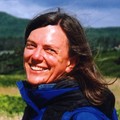Diane Lockward
Nicholasville, Kentucky: Wind Publications, 2006.
100 pages. Paperback: $15.00, ISBN # 1-893239-57-8.
__________________________________________________________________________________________
Indeed – just as one’s positive sense of self, one’s happiness, one’s sense of security can be fed by growing up in a loving family; just as bodily pleasure can be fed by the touch of a lover, or by meringue, layers of chocolate, ripe strawberries, and the intimacy of the long-married (“Anniversary) – so, too, can anger be fed, and grief, and fear, and guilt, and shame. Here, between front and back covers, Lockward unflinchingly serves up the roots of her psyche, in all its complexity, and more. In this American “super-size” society, where food is love and love is food, what really feeds us, Lockward suggests, is everything – past and present – that makes us who we are.
One of the many things that distinguish the poems in What Feeds Us is the poet’s consistent use of language that both sings and stings. Luscious, voluptuous, delicious language. “The First Artichoke” ends with one of my many favorite Lockward lines: “down to the small filet of delectable heart.” In “Invective Against the Bumblebee,” juicy, Latinate words like “sycophant” and “exonerate,” and “perverse pedagogue,” politely share space with the spunky vernacular: “fat-assed insect,” “May you pass by an oak tree just in time/ to be pissed on by a dog.”
Lockward’s strength is evidenced also by her admirable directness, her honesty, her matter-of-factness about her own sexuality, passions, and shortcomings. Not many poets dare, as Lockward dares, to include poems to and about a husband and poems to and about lovers, between the same two covers. In “Idiosyncracies of the Body,” we read “I am unclean in my body.... In fashion I am most comfortable in turtlenecks..... I have never walked naked/ in front of a man, not my husband/ or my lovers...” In “Pyromania,” we read that “silicone in the breasts/ must be excised before cremation/ or it blows up, liquefying to a dangerous substance,/ destroying the crematorium./ I’d like to have breasts like that....”
Readers who delight, as I do, in playfulness, will notice how even the lightest poems are often edged with despair, and will appreciate Lockward’s black humor as one way of coming close to her subject matter without being consumed by it. In “They Weren’t June and Ward Cleaver,” a poem about parental neglect, Lockward tells us how she turned into the pickle just as her parents warned she would, if she wouldn’t stop eating them. “The Tomato Envies the Peach,” a persona poem, reveals – in the poet’s speaking for the tomato – some of the abuse she, too, may have endured.
__________________________________________________________________________________________
 Born in Aurora, Illinois, Ingrid Wendt divides her time between Eugene and Seal Rock, Oregon. A three-time Fulbright Professor to Germany, her most recent books include The Angle of Sharpest Ascending (winner of the Yellowglen Award, Word Press), and Surgeonfish (winner of the Editions Prize, WordTech Editions). In April 2008 she was inducted into the Fox Valley (Illinois) Arts Hall of Fame. She has received the Distinguished Achievement Award from her alma mater, Cornell College (Iowa). With Elaine Hedges, she co-edited the anthology In Her Own Image: Women Working in the Arts (The Feminist Press and McGraw-Hill) and, with Primus St. John, From Here We Speak: An Anthology of Oregon Poetry. Recent poems can be found in Prairie Schooner and on the web at www.drunkenboat.com, 9th issue, March 2008.
Born in Aurora, Illinois, Ingrid Wendt divides her time between Eugene and Seal Rock, Oregon. A three-time Fulbright Professor to Germany, her most recent books include The Angle of Sharpest Ascending (winner of the Yellowglen Award, Word Press), and Surgeonfish (winner of the Editions Prize, WordTech Editions). In April 2008 she was inducted into the Fox Valley (Illinois) Arts Hall of Fame. She has received the Distinguished Achievement Award from her alma mater, Cornell College (Iowa). With Elaine Hedges, she co-edited the anthology In Her Own Image: Women Working in the Arts (The Feminist Press and McGraw-Hill) and, with Primus St. John, From Here We Speak: An Anthology of Oregon Poetry. Recent poems can be found in Prairie Schooner and on the web at www.drunkenboat.com, 9th issue, March 2008.